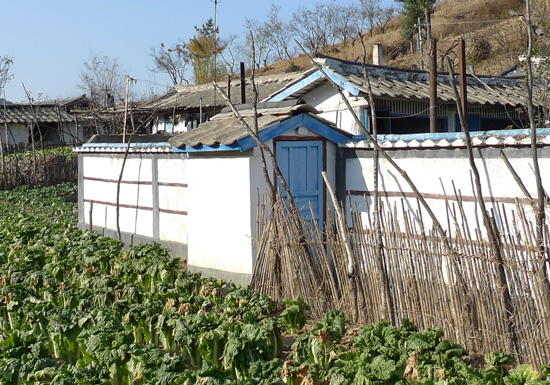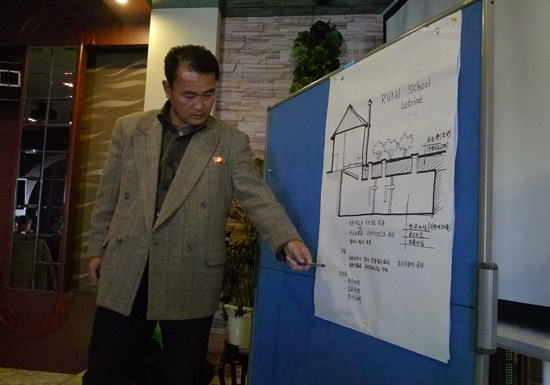A Blog by Dr. Yang Zhenbo, WASH Specialist at UNICEF China
Toilets are my business. Making sure people have them, understand why they are important and ultimately use them has been the focus of my work for the last 25 years. As a Sanitation and Hygiene expert for UNICEF China, I was eager to go to DPR Korea to see how I could support my colleagues in seeing how we can scale up sanitation for rural families.

©UNICEF/China/2014
Yang Zhenbo (forth from left front row) and other participants to the workshop pose for a group photo in Pyongyang, DPR Korea. |
Good sanitation is one of the most important investments countries can make in the wellbeing of their population. For children, especially those under five, it can make the difference between life and death. By having toilets and through washing hands with soap, global evidence clearly demonstrates significant reduction in water borne diseases, like diarrhoea and cholera, which can be deadly for young children, and contribute to improve under-nutrition, like stunting which is also vital for children's growth and development.
UNICEF has been working over the last few years to strengthen the collaboration and exchange experiences and best practises to sanitation and hygiene promotion between China and DPR Korea.
On my visit late last year to DPR Korea, I was impressed how clean and well maintained the latrines were in counties I visited, yet it is also clear that DPR Korea and China share many similar problems in addressing rural sanitation.
Here in China, despite massive progress in scaling up access to improved sanitation, 470 million people in rural areas are still missing out. Recently, China's President Xi Jinping added his voice to make sanitation an important priority, and committed to scaling up rural coverage.
While clean latrines on surface are not rare at all in DPR Korea, rural residents still keep using pit latrines just as many of their Chinese counterparts do. And most of the toilets are not hygienic and people don't know the link between the use of sanitary latrines and health and nutrition.
According to statistics from UNICEF and the World Health Organization, in 2011, 82 per cent of the population in DPR Korea had access to improved sanitation facilities, while the coverage was only 73 per cent in the rural areas.
Although lagging behind in its development, during my visit it was clear that local communities were eager to learn more about sanitation and to improve their quality of life.
We were granted unprecedented access to sanitation facilities at rural households, health centres, local offices, schools and kindergartens during our field trips to Hyangsan County and Yongtan County, which are located to the north and south of Pyongyang respectively.

©UNICEF/China/2014/Yang Zhenbo
A rural household latrine in Hyangsan County, DPR Korea. |
Latrines in these two counties, big or small, are mostly buildings with white walls and black tiles. As a result of good maintenance, both the exterior and interior of the latrines looked very clean and neat (though excreta is exposed). And each stall in the latrines has a door to ensure the privacy of users.
It is also worth mentioning that a latrine at an office compound in Yongtan has its ladies' room occupy twice the space of that of the men's room, and we were told that it is a common practice throughout the country. Greater areas for female toilets embrace more gender equality given the unequal wait times outside men's and women's public toilets. In China, it is a common scene that women have to endure long queues outside the ladies' room only to see men walking in and out of the gentlemen's, which once prompted some young women to launch an “occupy gentlemen's movement” to demand more public toilet stalls for women.
However, safe sanitation remains an important issue, especially as in many cases, excreta is exposed still posing a major health threat.
While the data about how the human excreta's exposure to the environment impacts children's health and nutrition is not available in the DPR Korea, based on studies from other parts of the world, the impact to children's health by faecal-oral diseases, such as diarrhoea and parasitic infection and poor absorption of nutrients as a physiological reaction to an contaminated environment is a problem that contributes to under five mortality in many countries.
Encouragingly, DPR Korea authorities have demonstrated a commitment to improve rural sanitation facilities. In July 2013, DPR Korea officials paid a visit to China and held a meeting with the National Patriotic Health Campaign Committee Office to learn from China's experience in improving rural latrines. They also visited a UNICEF-sponsored project in Shaanxi Province, where double urn septic tanks were being built, and conceived the idea of introducing similar facilities to their own rural regions.
During my visit to Pyongyang, UNICEF held a four-day workshop on water and sanitation that brought officials from nine government agencies including the Ministry of City Management and the Ministry of Public Health, as well as academics from local universities, to see how through a multi-stakeholder approach, sanitation and good hygiene could become everyone's business.

©UNICEF/China/2014/Yang Zhenbo
An expert from DPR Korea presents the design of a school latrine at the workshop. |
Learning about how UNICEF helped China craft strategies to improve rural latrines and the experience in China's development, officials at the meeting showed great interest. They raised a variety of questions with me, ranging from improved latrines' impacts on health, our assessment over different types of latrines' effectiveness in killing pathogenic microorganisms and some technical details. On the final day of the workshop, they expressed the hope of introducing double-urn latrines and triple septic tank latrines that are widely used in China to improve sanitation facilities in rural households and schools, and getting the right resources and investment to help improve their coverage.
UNICEF, which is already working to improve water supply, is also hoping to expand the collaboration to promote sanitation and hygiene in schools and communities in the country. As a start, UNICEF is exploring the possibility of buying 105 double-urn latrines, which are low cost but can effectively eliminate human waste's exposure to the environment, from Chinese enterprises for a pilot scheme in the DPR Korea. We aim to examine whether this type of toilet is suitable to be used at a large scale in the DPR Korea's rural areas, its maintenance costs and whether the people will like it.
Hopefully, with the much needed funds, we can gather data in the pilot counties about how effectively improved latrines help contain the spread of faecal-oral diseases and lead to better nutrition among children in DPR Korea.
It is clear from the families I met in rural DPR Korea, that there is an eagerness to learn from others and a desire to improve the health of their children. Simple interventions in sanitation and good hygiene promotion are one concrete way we can achieve that goal.































